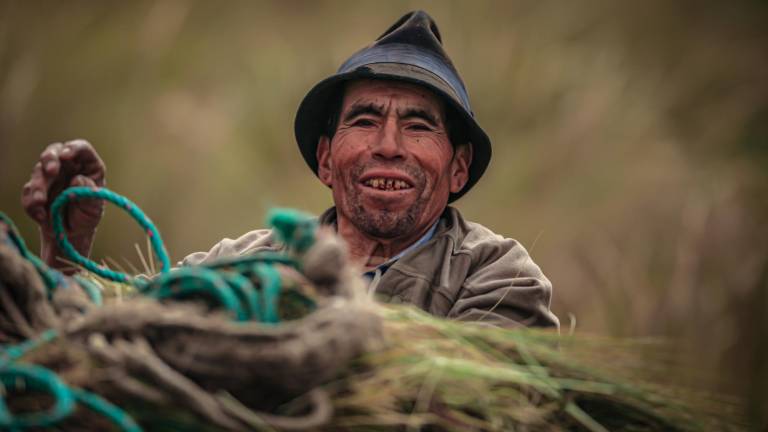BALTAZAR USHCA: THE LAST ICEMAN OF CHIMBORAZO AND THE LEGACY OF AN ANCIENT TRADITION
Baltazar Ushca, known as "the last iceman of Chimborazo," is an emblematic figure in Ecuador, whose story has captivated both Ecuadorians and people around the world. His recent passing not only marks the end of an ancient trade, but also prompts deep reflection on the importance of our roots, traditions, and the relationship between humans and nature.
For more than half a century, Baltazar would rise before dawn to embark on a hard and solitary journey toward the glaciers of Mount Chimborazo, the highest mountain in the country and one of Ecuador's most iconic natural symbols. Accompanied by his faithful mule and using rudimentary tools, he would extract large blocks of natural ice and transport them back to local communities. This ice, manually cut from the glaciers at over 4,000 meters above sea level, was used to preserve food and in the production of traditional paila ice cream, known for its flavor and freshness. But beyond its practical use, Chimborazo’s ice held cultural significance, linking people to nature and a tradition that had endured for generations.
Baltazar, a descendant of a long line of icemen, learned the trade from his father and brothers. Throughout his life, he saw one by one how the other members of his family abandoned the practice, either due to modernization or the extreme difficulty of the work. Over time, refrigerators and technology replaced the need for natural ice, and the challenges of obtaining it, worsened by climate change, meant that fewer people were willing to continue the trade. However, Baltazar remained loyal to his tradition, climbing Chimborazo week after week, despite the changing times and the decreasing demand for his work.
Over the years, Baltazar Ushca’s figure became known not only in Ecuador but internationally. His story was immortalized in documentaries like The Last Iceman of Chimborazo, where his life and labor were presented as a testament to resilience and dedication. At a time when many ancestral traditions are at risk of extinction, Baltazar became a living symbol of cultural resistance, of the effort to keep alive knowledge passed down through generations, and of the intimate connection between humans and nature.
Baltazar’s death marks the end of an era. With him, one of the last witnesses of a centuries-old tradition disappears, but his legacy will endure. He is not only remembered as the last iceman of Chimborazo, but as a man who, against all odds, kept alive a practice that defined his community and culture. His story represents daily effort, humility in the face of nature’s vastness, and deep respect for ancestral knowledge.
For Ecuador, the death of Baltazar Ushca is a significant loss. His life was an example of the country’s cultural richness and the importance of preserving our roots. Through his work, he reminded all Ecuadorians that traditions, no matter how ancient, are a vital part of our identity. In an increasingly globalized and modern world, it’s easy to forget the value of ancestral practices, but figures like Baltazar remind us of the importance of keeping alive the customs that connect us to our history and to the land itself.
Baltazar’s legacy should not be seen as a closed chapter, but as a call to action. It invites us to reflect on how we can honor and protect the traditions that define our nation. The story of the icemen of Chimborazo is just one of the many that form part of Ecuador’s cultural wealth, and each of them deserves to be preserved and celebrated. In a country as diverse as Ecuador, filled with majestic landscapes and traditions that have endured for centuries, the challenge is finding ways to integrate this ancestral knowledge into the modern world.
With his simplicity and strength, Baltazar Ushca left an indelible mark on Ecuador’s history. His life was an example of how traditions and modernity can coexist, as long as there is a will to keep our cultural heritage alive. Today, his story continues to inspire those who seek to preserve the essence of Ecuador, a country where the mountains speak and the ancestors teach us to live in harmony with nature.
At Ecuador Emotions, we pay tribute to Baltazar Ushca, not only as the last iceman of Chimborazo but as a true guardian of our country’s culture and traditions. Through his story, we are reminded of the importance of valuing our roots and learning from those who, like Baltazar, have dedicated their lives to keeping Ecuador’s cultural heritage alive.

